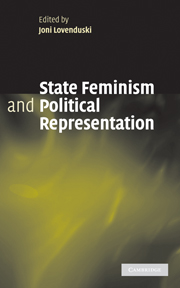Book contents
- Frontmatter
- Contents
- List of figures
- List of tables
- Notes on contributors
- Preface
- List of abbreviations
- 1 Introduction: state feminism and the political representation of women
- 2 Gendering political representation: debates and controversies in Austria
- 3 The Belgian paradox: inclusion and exclusion of gender issues
- 4 A politics for presence: state feminism, women's movements and political representation in Finland
- 5 Gendering the republican system: debates on women's political representation in France
- 6 WPAs and political representation in Germany
- 7 Gendering the debate on political representation in Italy: a difficult challenge
- 8 High tides in a low country: gendering political representation in the Netherlands
- 9 The women's movement, gender equality agencies and central-state debates on political representation in Spain
- 10 Party feminism, state feminism and women's representation in Sweden
- 11 Party government and women's representation debates: the UK
- 12 Women's policy agencies, the women's movement and representation in the USA
- 13 Conclusions: state feminism and political representation
- Appendix 1 Tables of women's representation in eleven countries
- Appendix 2 The RNGS model: summary of variable descriptors
- Index
- References
6 - WPAs and political representation in Germany
Published online by Cambridge University Press: 22 September 2009
- Frontmatter
- Contents
- List of figures
- List of tables
- Notes on contributors
- Preface
- List of abbreviations
- 1 Introduction: state feminism and the political representation of women
- 2 Gendering political representation: debates and controversies in Austria
- 3 The Belgian paradox: inclusion and exclusion of gender issues
- 4 A politics for presence: state feminism, women's movements and political representation in Finland
- 5 Gendering the republican system: debates on women's political representation in France
- 6 WPAs and political representation in Germany
- 7 Gendering the debate on political representation in Italy: a difficult challenge
- 8 High tides in a low country: gendering political representation in the Netherlands
- 9 The women's movement, gender equality agencies and central-state debates on political representation in Spain
- 10 Party feminism, state feminism and women's representation in Sweden
- 11 Party government and women's representation debates: the UK
- 12 Women's policy agencies, the women's movement and representation in the USA
- 13 Conclusions: state feminism and political representation
- Appendix 1 Tables of women's representation in eleven countries
- Appendix 2 The RNGS model: summary of variable descriptors
- Index
- References
Summary
Introduction
Since its 1949 founding, the political system of the Federal Republic of Germany (FRG) has rested firmly on the principle of representative democracy. The framers of the German constitution, fearing supposed anti-democratic popular tendencies, designed moderating institutions between the people and the exercise of power. Political parties became the most important of these. Political scientists have characterised the FRG as a ‘party-state’ in which parties make all of the most important political decisions. The German constitution, the Basic Law, explicitly assigns them the role of ‘forming the political will of the people’ (Conradt 1993: 84–85). Parties control access to the legislatures at all levels, in terms of both candidate selection and group access to the policy-making process. Strict party discipline, especially at the federal level, assures party dominance.
Germany has a neo-corporatist system in which interests are organised and articulated in a structured fashion. Interest groups must have state recognition to obtain formal representation in the policy process (Dalton 1993: 237, 271). Interest representation has traditionally been channelled through four major interest alignments (mainly business and labour, less crucially agriculture and churches), each with direct access to the parties and government bureaucracies. Groups outside of these four categories have had difficulty gaining access to policy channels (see Conradt 1993: 109).
Women's political representation in Germany has traditionally lagged behind some other western European countries, but began to catch up in the 1990s. Today women are represented at a rate above the European Union average.
- Type
- Chapter
- Information
- State Feminism and Political Representation , pp. 106 - 129Publisher: Cambridge University PressPrint publication year: 2005
References
- 4
- Cited by



